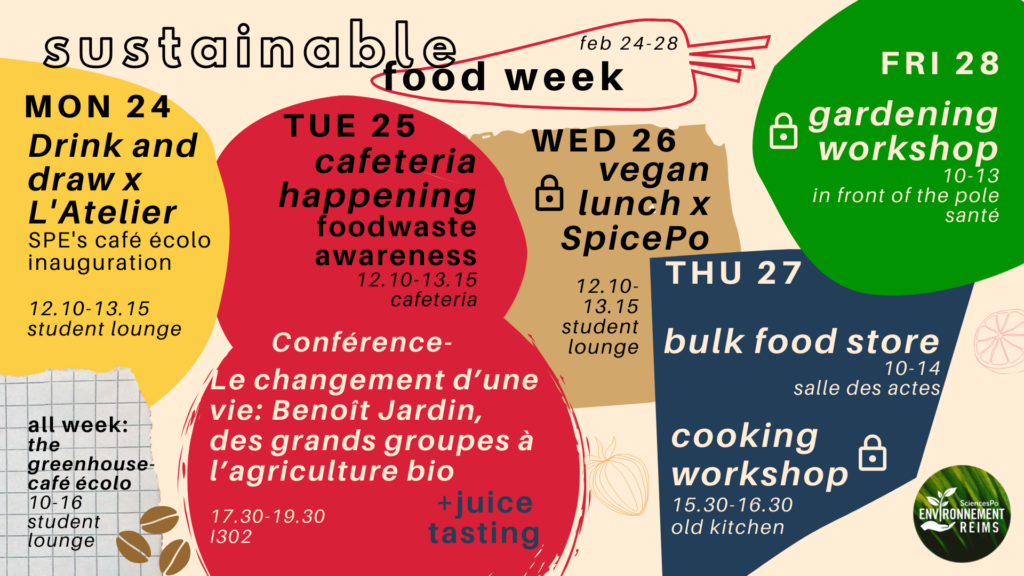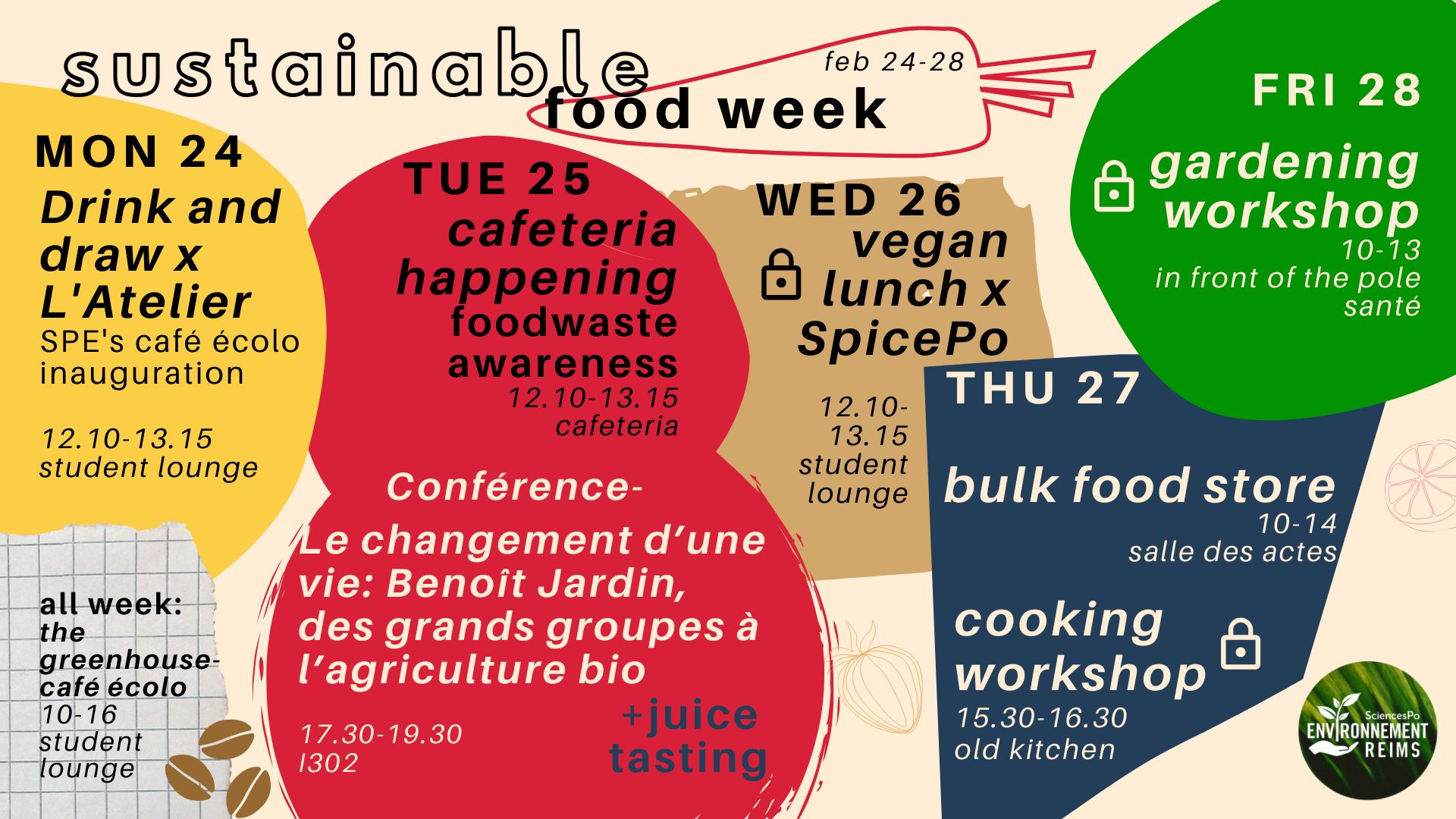 Traduction en anglais:
Traduction en anglais:
Written by Charlotte Hourdin and Matthew Capuano Rizzo
Blurb: As part of Sciences Po Environment’s actions supporting sustainability and ahead of the European-wide mobilization in April, the Reims branch is organizing a week centered on food. Organic, local, zero waste, and vegan products, there will be something for everyone! SPE Reims presents its objectives and key events of the week.
In 1992, more than 1,700 independent scientists issued a warning to humanity, stating that it is essential to make a profound change in our management of the Earth and the life it harbors if we want to avoid great human misery. 25 years later, on November 13, 2019, more than 15,000 scientists from 183 countries issued a second “World Scientists Warning to Humanity.” This action preceded the release of the UN Environnemental Programme’s Emissions Gap Report, which found that we now need to reduce emissions by 7.6% every year between 2020 et 2030. The report also stated that if we do nothing beyond our current, inadequate commitments to halt climate change, temperatures will rise to 3.2 degrees celsius above pre-industrial levels, with devastating effects.
Agriculture constitutes 23% of global greenhouse gas emissions and livestock production, particularly of beef, contributes to 80% of world deforestation. With sustainable food week, SPE has organized concrete activities for reducing your carbon footprint in your food.
-
- Eat without waste:
- Problem: 10 million tons of food, equivalent to 16 billion euros, are wasted each year in France. In the world, ⅓ of all food produced is wasted. In addition to these negative economic effects, food waste contributes considerably to greenhouse gas emissions. For example, in the United Kingdom, a ton of food waste produces between 4 and 4,6 tonnes of CO2.
- Solution 1: Tuesday at 12 in the cafeteria, Sciences Po Environnement is organizing a food waste audit and demonstration. Designating specific trash cans for food waste, we will calculate the impact of our daily meals in the cafeteria. This initiative will enable us to understand the scale of the problem of food waste and measure the effects of various solutions.
- Solution 2: Thursday at 12 in the glass hallway, SPE will set up a “Bulk Food Store.” 800 million tonnes of waste, 25,35 kilos per second, are produced in France. Buying zero-waste and in bulk will allow you not only to reduce your environmental footprint, but also to save money. For example, buying oats in bulk is 219% less expensive than buying packaged oats.
- Problem: 10 million tons of food, equivalent to 16 billion euros, are wasted each year in France. In the world, ⅓ of all food produced is wasted. In addition to these negative economic effects, food waste contributes considerably to greenhouse gas emissions. For example, in the United Kingdom, a ton of food waste produces between 4 and 4,6 tonnes of CO2.
- Regain your food independence:
- Eat without waste:
- Problem: Residents of France eat 1 out of 7 meals at restaurants, a tendency that has intensified in recent years. Even those who manage what they eat at home do not apply the same level of scrutiny to their restaurant meals. For example, the volume of burgers consumed has multiplied by 14 in ten years.
-
-
- Solution 1: Thursday afternoon from 15:30 to 16:30 in the old kitchen, SPE will host a cooking workshop. You will learn how to live without harmful products such as palm oil and make nutella in a sustainable way. In addition, you will learn how to make a vegan meal, eat healthier, and cheaper.
- Solution 2: Friday at 12 in front of the health center, SPE will host a gardening workshop. Gardening is not only beneficial for your body, but also your psychological health! According to numerous studies, both interaction with nature and the consumption of a healthier diet reduce anxiety, depression, and improve stress management. Growing vegetables (or purchasing paniers bios) instead of buying them at the supermarket can save you a lot of money. The french, on average, spend 182 euros per month on produce. A half panier bio once per week costs only 67 euros for 4 months.
-
- Reduce meat consumption and participate in a vegan challenge:
- Problem 1: According to a 2019 IPCC report on land use and climate change, human use affects more than 70% of ice-free land. This use involves extensive livestock production, forestry, and resource exploitation. Agriculture accounts for more than 70% of the world’s use of freshwater. Till agriculture causes soil degradation to occur at levels 100 times greater than soil formation. Since the industrial period, air surface temperatures have increased two times greater than average world temperatures. Agriculture contributes to this warming, producing 13% of CO2, 44% of methane, and 81% of nitrous oxide to account for 23% of world greenhouse gas emissions.
- Problem 2: While meat and dairy production only produces 18% of calories and 37% of proteins, these activities occupy 83% of agricultural land and produce 60% of the sector’s greenhouse gas emissions. Beef results in 105kg of greenhouse gas emissions per 100g of protein, while tofu produces less than 3.5kg of emissions for the same amount.
- Problem 3: Extensive cattle ranching is responsible for 80% of world deforestation, producing more than 340 million tonnes of carbon each year. The European Union imports more than $600 million USD (553 million euros) of beef each year from Brazil, a country that possesses 88% of the cattle herds in the Amazon. Between 1990 and 2016, the world lost 1.3 million square kilometres of forests. 46% of all trees have already been cut.
- Solution: Wednesday at 12 in the student lounge, SPE and SpicePo will offer you a vegan lunch. Reducing your consumption of meat and dairy products is the single biggest way you can reduce your environmental impact! With the expertise of SpicePo, you will learn how!
- Eat local:
- Problem: Although the production of the food you eat (beef, lamb, cheese) constitutes a larger part of your carbon footprint than the transport of such food, eating locally can still reduce your environmental footprint! For example, it takes 14 liters of water to produce a glass of almond milk. California, which produces more than 80% of the world’s almonds, has been in a drought for the better part of the past decade.
- Solution: Tuesday afternoon from 17:30 to 19:30 in I302, Benoît Jardin, a farmer and producer of organic juices will present his work. This talk will be accompanied by a juice tasting!
- All of these events culminate in our café écolo initiative The Greenhouse!
- Beginning this week, Café écolo will be an alternative solution to the Crous with organic, local, and zero waste options.
France is the fourth most vulnerable country in the world to the effects of the climate crisis. The heat waves in June and July of 2019 led to more than 1,500 deaths and experts estimate that extreme heat events are 100 times more likely than a century ago. 2019 was the second hottest year on record. Scientists estimate that global temperatures may be higher than they have ever been in the history of human civilization.
In addition to working with administration on the implementation of Sciences Po’s institutional plan for the ecological transition, with sustainable food week, SPE hopes to offer strategies to reduce your individual carbon footprint! Thank you for participating!
Other posts that may interest you:
- Local Victories for Turkish Opposition — A Sign of Hope?
- Are France and Japan a Mismatch Made in Heaven?
- A Reflection on Dark Tourism
- Cadavre Exquis : Goodbye stranger
- An Untoward Progress?
Discover more from The Sundial Press
Subscribe to get the latest posts sent to your email.





